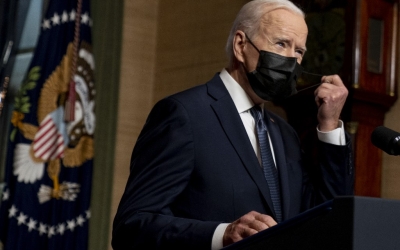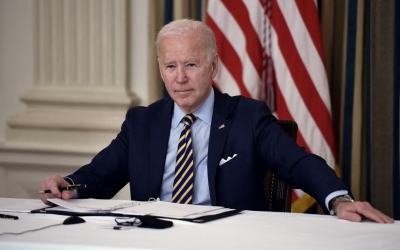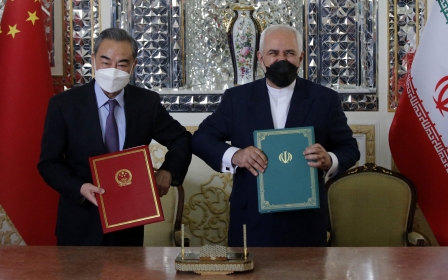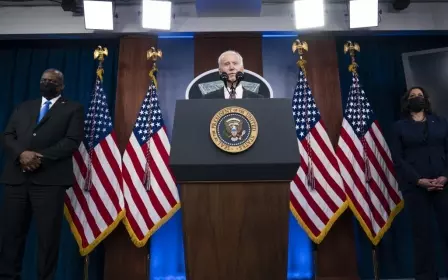US Senate attempts to curb China's Middle East influence
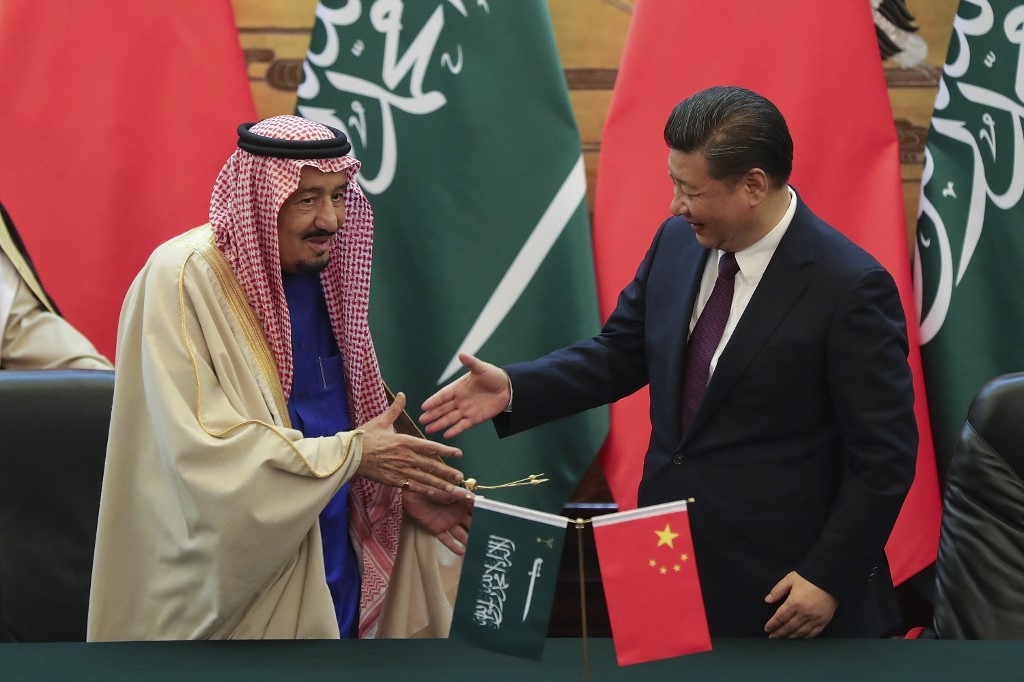
The US Senate has advanced legislation designed to counter China's growing global influence, including in the Middle East, where Beijing has increased trade links and investment in recent years.
The legislation, which passed through the Senate Foreign Relations Committee last month, includes $300m for a "Countering Chinese Influence" fund, and $100m in funding for journalists and media companies to "raise awareness of and increase transparency regarding the negative impact of activities related to the Belt and Road Initiative".
After being passed out of committee, the legislation was folded into multiple others under one combined bill: the Innovation and Competition Act.
The Senate advanced that legislation late on Thursday, but it still faces additional procedural votes and potentially dozens of hours of debate.
While the bill's central focus is the Indo-Pacific region, where it proposes $1bn in funding to counter Beijing, it also outlines a number of ways for the US to challenge China's Belt and Road Initiative (BRI) in the Middle East.
New MEE newsletter: Jerusalem Dispatch
Sign up to get the latest insights and analysis on Israel-Palestine, alongside Turkey Unpacked and other MEE newsletters
The legislation says China's economic and military influence in the Middle East comes at the expense of American national security interests.
With the US currently having the largest security presence in the region, some analysts say concerns of a national security threat there, as shown in the bill, may be overstated - despite China's growing economic and diplomatic presence.
US anti-BRI push
The bill would require the Biden administration to create a strategy for how to counter China and its BRI plans in the Middle East, including an assessment of Beijing's current presence in the region, how the US could improve its security ties there, and how Washington can create more public and private sector investment.
"The economic influence of the People's Republic of China through its oil and gas imports from the Middle East, infrastructure investments, technology transfer, and arms sales provide influence and leverage that runs counter to United States interests in the region," the legislation reads.
While it does not offer specific projects or funding, the legislation's section on the Middle East says the US needs to improve its security cooperation with allies, and also increase engagement on infrastructure projects, including ports.
John Calabrese, director of the Middle East-Asia Project at the Middle East Institute, said Washington should not just work to "present a critique of the BRI but in select cases to offer project alternatives".
"American interests and influence would be at grave risk over the longer term were the US to remain passive in the face of an effort of such great scale and magnitude," he said, referring to BRI.
Still, he noted that it is risky for the US to associate every Chinese project in the Middle East "with a grand strategic ambition to either undercut the United States or replace the United States".
"I think this is a wild exaggeration. It may come to be, I don't think it's there yet," he said.
Adam Ni, an analyst at the China Policy Centre in Canberra, Australia, said the legislation was a sign that Washington is worried about the BRI and of "China's grand geopolitical project to become more powerful and a country that could displace" the US on the world stage.
Still, Ni said he doubted the millions of dollars "earmarked towards countering Chinese influence will be that successful", due in part to the ability of the BRI "to gain leverage of other countries, to gain economic and political influence, to reshape the connectivity of trade, investment and industry chains".
China's MENA investment
A total of 17 countries in the Middle East have signed up to BRI, a massive global infrastructure project that seeks to connect China with the rest of the world through a series of land, maritime, and also digital networks.
Not all of these countries have BRI projects, with some only having endorsed the initiative, according to the Council on Foreign Relations.
In Egypt, China has set up the Suez Economic and Trade Cooperation Zone, an economic and trade hub hosting Chinese entities and businesses. Beijing is also constructing a Central Business District in the country's new administrative capital.
In the Gulf, Beijing has a number of deals with Saudi Arabia and the United Arab Emirates for oil and gas that have helped the country become the world's largest importer of crude oil in the past few years.
'China is the largest trading partner of the Arab League countries'
- Afshin Molavi, Johns Hopkins University
Iran and China also signed a massive 25-year "strategic cooperation" deal in March.
Some countries in the Middle East are also using 5G networks that have been built by China's telecommunications company Huawei.
"China is the largest trading partner of the Arab League countries and the largest foreign investor in many countries across the region," said Afshin Molavi, senior fellow at the Johns Hopkins University SAIS Foreign Policy Institute.
"China is clearly a major geo-economic actor in the region and, in some cases, the most important one."
The legislation in Congress proposes the US warn its allies about the risks that using Chinese technology could subject them to surveillance and monitoring, and offer alternative "clean paths" to such technology.
Yet this method of offering these countries a binary choice between the US and China may actually work to harm Washington's influence, Molavi noted.
Countries in the Middle East "resent it when the US tells them they must choose between Washington and Beijing", he said. "For most countries, this is a false binary."
China benefits from US security presence
One of the legislation's main concerns is that BRI is being used to pave the way for the establishment of military facilities in various countries of the Middle East and the severance of US national security interests.
"Anytime any country that is a strategic competitor to the United States, there's going to be concern about any sort of military presence that it has in the region," said Lucille Greer, a Schwarzman fellow at the Wilson Center's Kissinger Institute on China and the United States.
Currently, the country has one military base in the region, located in Djibouti.
The Pentagon has previously warned that it expects China to expand its military bases around the world, and the Senate bill warns that Beijing is seeking to create "military or dual-use" facilities in the Middle East under the guise of BRI.
Greer, however, said that for the time being this was unlikely to happen - partly because "China is a direct beneficiary of United States security architecture in the region".
With the original reason for US military installations and security installments in the Middle East being to protect the free flow of oil, and China now being one of the largest customers of oil coming from the region, Greer said that it is still to Beijing's benefit to rely on a US security presence.
Molavi said while China had matured its economic ties with countries in the region, it would be years before the country took a step towards becoming a major security force.
"A world in which China plays a larger role in MENA security? We are not there yet and we will not likely be there for at least another decade," Molavi said.
Middle East Eye delivers independent and unrivalled coverage and analysis of the Middle East, North Africa and beyond. To learn more about republishing this content and the associated fees, please fill out this form. More about MEE can be found here.


